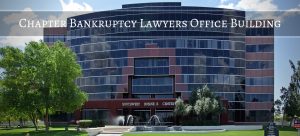FREQUENTLY ASKED BANKRUPTCY QUESTIONS
Many clients worry about losing their doctor when filing for bankruptcy, particularly when seeking to discharge medical debt. While some providers may request payment plans or deny non-urgent care until balances are settled, this varies by practice.
Medical bills are considered unsecured debt, which can typically be discharged in Chapter 7 bankruptcy. When a bankruptcy is filed, and money is owed to a doctor, this debt and creditor are required to be listed in your bankruptcy petition. Filing for bankruptcy does not automatically require you to change doctors.
Your doctor may drop you as a patient if you discharge the money you owe in bankruptcy, as long as you do not need emergency care. Federal law requires a person seeking emergency medical treatment at an emergency department to be treated and stabilized.
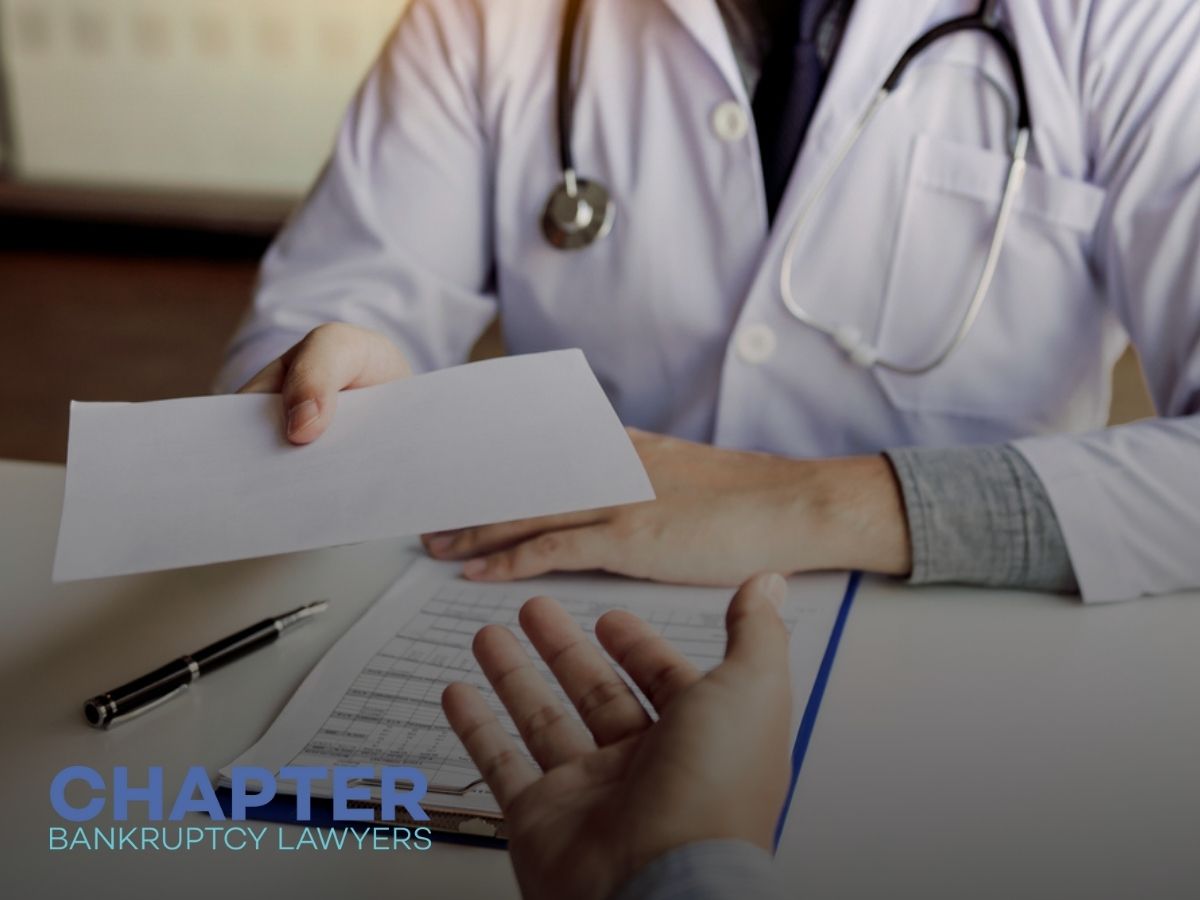
What Happens to My Medical Debt in Bankruptcy, and How Could It Impact My Healthcare?
Medical debt is one of the leading causes of financial distress in the U.S., and bankruptcy offers a practical way to address it. Medical bills are typically considered unsecured debt, meaning they’re not tied to collateral like a car or house. In Chapter 7 bankruptcy, unsecured debts, including medical bills, are usually discharged entirely, offering immediate relief.
In Chapter 13 bankruptcy, medical debt is included in your repayment plan, where you make manageable monthly payments over 3-5 years. At the end of the plan, any remaining medical debt is discharged. Filing for bankruptcy does not affect your eligibility for healthcare or prevent you from seeing medical providers. However, some providers may require upfront payments for future services after a bankruptcy discharge.
This practice is not universal and varies by provider. Consulting with an experienced bankruptcy attorney might be a good idea to ensure you understand how to address medical debt.
Can I Include Medical Bills in My Bankruptcy Filing Without Changing Doctors?
Yes, you can include medical bills in your bankruptcy filing without necessarily changing your current healthcare providers. Medical debt is treated like other unsecured debts, making it eligible for discharge or reorganization in bankruptcy. However, while filing for bankruptcy can eliminate past-due medical bills, it does not prevent healthcare providers from requiring upfront payment for future treatments.
Some doctors and hospitals may decide to stop offering services if you have outstanding discharged balances, but this is not always the case. Many providers are willing to continue care if you remain current on future bills. Open communication is essential. Inform your healthcare providers about your bankruptcy filing and discuss their payment policies moving forward. A qualified bankruptcy attorney can help you navigate these conversations and ensure that including medical bills doesn’t disrupt your access to necessary care.
Will My Health Insurance Be Affected If I File for Bankruptcy?
No, filing for bankruptcy does not directly impact your health insurance coverage. Your health insurance coverage remains unaffected as long as you keep up with premium payments.
Health insurance policies are generally exempt assets, meaning they are protected during the bankruptcy process. If you have an employer-sponsored health plan, it remains active as long as you stay employed and fulfill the policy requirements. Nevertheless, if you’re behind on premiums for a private or self-purchased plan, those arrears may need to be addressed during the bankruptcy filing.
It’s also important to note that filing for bankruptcy does not affect your eligibility for government-subsidized insurance programs such as Medicare or Medicaid. If you’re worried about losing coverage, work closely with your bankruptcy attorney to ensure your health insurance remains unaffected. Maintaining insurance coverage during and after bankruptcy is crucial to protecting yourself from future medical expenses and financial stress.
Will Filing for Bankruptcy Stop Collection Calls from Medical Providers?
Yes, filing for bankruptcy provides immediate relief from collection calls and other debt collection efforts related to medical bills. When you file, an automatic stay goes into effect. This court-ordered protection prevents creditors, including medical providers and collection agencies, from continuing collection activities such as calls, letters, or lawsuits. The automatic stay ensures you have time to reorganize your finances without constant harassment.
Under Chapter 7, medical debts are typically discharged, meaning you no longer owe them, while Chapter 13 includes medical debts in a repayment plan with manageable monthly payments. This process allows you to regain control over your financial situation and focus on addressing other pressing needs. If you’re overwhelmed by collection calls, bankruptcy can provide immediate relief and a long-term solution to eliminate or reduce your medical debt.
Are Medical Debts Treated Differently in Bankruptcy, and How Does This Affect My Doctor?
Medical debts are treated as unsecured debts in bankruptcy, which places them in the same category as credit card debt and personal loans. This means they are eligible for discharge in Chapter 7 bankruptcy or included in a repayment plan under Chapter 13. For most patients, this provides substantial relief from the burden of unpaid medical bills. Unfortunately, discharging medical debts can affect your relationship with your doctor or healthcare provider.
While filing for bankruptcy prohibits providers from collecting on past-due balances, some may decide to limit or end services if they are no longer receiving payments. This decision is at the discretion of the provider and varies widely. To continue receiving care, discuss your bankruptcy filing and potential payment arrangements with your healthcare providers. An experienced attorney can also guide you on protecting your healthcare relationships post-bankruptcy.
Can I File for Bankruptcy If My Medical Debt Is Related to Chronic or Emergency Care?
Yes, you can file for bankruptcy if your medical debt is related to chronic conditions or emergency care. Bankruptcy is designed to provide relief for individuals facing unmanageable financial obligations, including those resulting from significant healthcare expenses. Whether the debt stems from long-term treatments for chronic illnesses or a sudden emergency requiring extensive care, medical debt qualifies for discharge under bankruptcy law.
In Chapter 7, the debt can be eliminated entirely, while Chapter 13 allows you to create a repayment plan for manageable contributions over time. Filing for bankruptcy immediately halts collection efforts, providing relief from aggressive calls and lawsuits. This allows you to focus on your health without the constant stress of unpaid medical bills. Consulting an AZ bankruptcy attorney can help you manage your chronic or emergency-related medical debts effectively while protecting your financial and personal well-being.
CONTACT OUR ARIZONA BANKRUPTCY LAWYERS
4500 S Lakeshore Drive Suite 300
Tempe, AZ 85282
3707 E Southern Ave
Mesa, AZ 85206
Many clients worry about losing their doctor when filing for bankruptcy, particularly when seeking to discharge medical debt. While some providers may request payment plans or deny non-urgent care until balances are settled, this varies by practice.
Medical bills are considered unsecured debt, which can typically be discharged in Chapter 7 bankruptcy. When a bankruptcy is filed, and money is owed to a doctor, this debt and creditor are required to be listed in your bankruptcy petition. Filing for bankruptcy does not automatically require you to change doctors.
Your doctor may drop you as a patient if you discharge the money you owe in bankruptcy, as long as you do not need emergency care. Federal law requires a person seeking emergency medical treatment at an emergency department to be treated and stabilized.

What Happens to My Medical Debt in Bankruptcy, and How Could It Impact My Healthcare?
Medical debt is one of the leading causes of financial distress in the U.S., and bankruptcy offers a practical way to address it. Medical bills are typically considered unsecured debt, meaning they’re not tied to collateral like a car or house. In Chapter 7 bankruptcy, unsecured debts, including medical bills, are usually discharged entirely, offering immediate relief.
In Chapter 13 bankruptcy, medical debt is included in your repayment plan, where you make manageable monthly payments over 3-5 years. At the end of the plan, any remaining medical debt is discharged. Filing for bankruptcy does not affect your eligibility for healthcare or prevent you from seeing medical providers. However, some providers may require upfront payments for future services after a bankruptcy discharge.
This practice is not universal and varies by provider. Consulting with an experienced bankruptcy attorney might be a good idea to ensure you understand how to address medical debt.
Can I Include Medical Bills in My Bankruptcy Filing Without Changing Doctors?
Yes, you can include medical bills in your bankruptcy filing without necessarily changing your current healthcare providers. Medical debt is treated like other unsecured debts, making it eligible for discharge or reorganization in bankruptcy. However, while filing for bankruptcy can eliminate past-due medical bills, it does not prevent healthcare providers from requiring upfront payment for future treatments.
Some doctors and hospitals may decide to stop offering services if you have outstanding discharged balances, but this is not always the case. Many providers are willing to continue care if you remain current on future bills. Open communication is essential. Inform your healthcare providers about your bankruptcy filing and discuss their payment policies moving forward. A qualified bankruptcy attorney can help you navigate these conversations and ensure that including medical bills doesn’t disrupt your access to necessary care.
Will My Health Insurance Be Affected If I File for Bankruptcy?
No, filing for bankruptcy does not directly impact your health insurance coverage. Your health insurance coverage remains unaffected as long as you keep up with premium payments.
Health insurance policies are generally exempt assets, meaning they are protected during the bankruptcy process. If you have an employer-sponsored health plan, it remains active as long as you stay employed and fulfill the policy requirements. Nevertheless, if you’re behind on premiums for a private or self-purchased plan, those arrears may need to be addressed during the bankruptcy filing.
It’s also important to note that filing for bankruptcy does not affect your eligibility for government-subsidized insurance programs such as Medicare or Medicaid. If you’re worried about losing coverage, work closely with your bankruptcy attorney to ensure your health insurance remains unaffected. Maintaining insurance coverage during and after bankruptcy is crucial to protecting yourself from future medical expenses and financial stress.
Will Filing for Bankruptcy Stop Collection Calls from Medical Providers?
Yes, filing for bankruptcy provides immediate relief from collection calls and other debt collection efforts related to medical bills. When you file, an automatic stay goes into effect. This court-ordered protection prevents creditors, including medical providers and collection agencies, from continuing collection activities such as calls, letters, or lawsuits. The automatic stay ensures you have time to reorganize your finances without constant harassment.
Under Chapter 7, medical debts are typically discharged, meaning you no longer owe them, while Chapter 13 includes medical debts in a repayment plan with manageable monthly payments. This process allows you to regain control over your financial situation and focus on addressing other pressing needs. If you’re overwhelmed by collection calls, bankruptcy can provide immediate relief and a long-term solution to eliminate or reduce your medical debt.
Are Medical Debts Treated Differently in Bankruptcy, and How Does This Affect My Doctor?
Medical debts are treated as unsecured debts in bankruptcy, which places them in the same category as credit card debt and personal loans. This means they are eligible for discharge in Chapter 7 bankruptcy or included in a repayment plan under Chapter 13. For most patients, this provides substantial relief from the burden of unpaid medical bills. Unfortunately, discharging medical debts can affect your relationship with your doctor or healthcare provider.
While filing for bankruptcy prohibits providers from collecting on past-due balances, some may decide to limit or end services if they are no longer receiving payments. This decision is at the discretion of the provider and varies widely. To continue receiving care, discuss your bankruptcy filing and potential payment arrangements with your healthcare providers. An experienced attorney can also guide you on protecting your healthcare relationships post-bankruptcy.
Can I File for Bankruptcy If My Medical Debt Is Related to Chronic or Emergency Care?
Yes, you can file for bankruptcy if your medical debt is related to chronic conditions or emergency care. Bankruptcy is designed to provide relief for individuals facing unmanageable financial obligations, including those resulting from significant healthcare expenses. Whether the debt stems from long-term treatments for chronic illnesses or a sudden emergency requiring extensive care, medical debt qualifies for discharge under bankruptcy law.
In Chapter 7, the debt can be eliminated entirely, while Chapter 13 allows you to create a repayment plan for manageable contributions over time. Filing for bankruptcy immediately halts collection efforts, providing relief from aggressive calls and lawsuits. This allows you to focus on your health without the constant stress of unpaid medical bills. Consulting an AZ bankruptcy attorney can help you manage your chronic or emergency-related medical debts effectively while protecting your financial and personal well-being.
Bankruptcy can be an effective solution for many debt-related problems but is not a universal fix for every financial challenge. It may not always be the best choice for every client. To make an informed decision, take advantage of our firm’s free consultation with experienced AZ bankruptcy attorneys. A personalized debt evaluation will help you explore your options and determine if bankruptcy aligns with your financial goals.
While bankruptcy can discharge certain debts, it does not apply to all types of obligations. For instance, debts like student loans, back child support, alimony payments, and most tax liabilities cannot typically be eliminated.
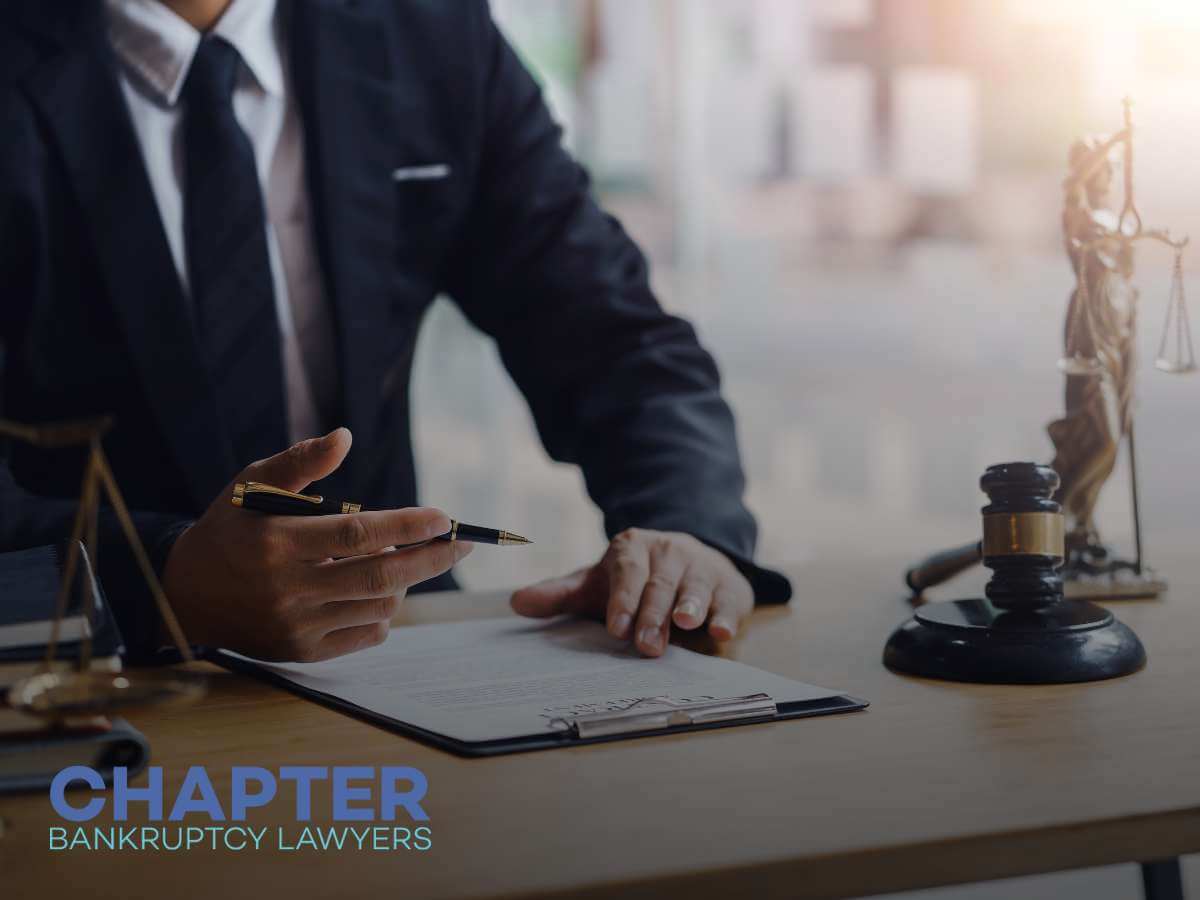
What Types Of Debts Are Excluded From Bankruptcy?
While bankruptcy is an effective tool for eliminating many kinds of debt, certain obligations are excluded and remain your responsibility even after the process is complete. These include legal and financial commitments deemed non-dischargeable under bankruptcy laws.
For instance, student loans are notoriously difficult to discharge and typically require proving undue hardship—a standard that’s rarely met. Similarly, court-ordered payments such as child or spousal support, as well as most tax debts, are categorized as priority obligations and are not affected by bankruptcy.
Criminal penalties, including restitution and fines related to DUI convictions or other offenses, are also not subject to discharge. It’s important to understand these exceptions to avoid surprises during the bankruptcy process. Consulting with a knowledgeable attorney ensures you have a clear understanding of which debts can and cannot be resolved through bankruptcy.
Will Bankruptcy Clear Tax Debts Or Other Government-Related Obligations?
Tax debts are challenging to discharge under bankruptcy laws. Only specific types of older tax debts may qualify under strict conditions, such as income taxes that are at least three years old, filed on time, and do not involve fraud.
However, most recent tax liabilities, payroll taxes, and penalties are not dischargeable. Additionally, debts related to government obligations, like fines or penalties for breaking the law, cannot be eliminated. This includes traffic tickets, criminal restitution, and court fines.
It’s important to note that even if certain tax debts are discharged, tax liens filed by the government before your bankruptcy will remain attached to your property. These limitations mean you may still have financial obligations to federal, state, or local governments after your bankruptcy case is resolved.
Can Bankruptcy Stop Foreclosure Or Repossession Permanently?
Bankruptcy can temporarily halt foreclosure or repossession through an automatic stay, which immediately stops creditors from pursuing collection actions. However, this relief is temporary.
For secured debts like a mortgage or car loan, bankruptcy doesn’t eliminate the creditor’s right to seize the collateral if payments remain unpaid. For instance, if you file for Chapter 7 bankruptcy, your personal obligation to pay the debt may be discharged, but the lien on the property remains. This means the lender can still foreclose on your home or repossess your car after the bankruptcy process if you can’t catch up on payments.
In Chapter 13 bankruptcy, you might be able to keep your property by restructuring your debt, but only if you can adhere to the repayment plan. Bankruptcy isn’t a permanent fix for secured debts.
Will Bankruptcy Remove Legal Obligations From Divorce Settlements?
Bankruptcy typically does not remove legal obligations stemming from divorce settlements. Debts like child support, alimony, and other court-ordered payments are considered priority debts and cannot be discharged under bankruptcy laws. Even property division agreements outlined in a divorce decree are often not dischargeable in Chapter 7 bankruptcy, though Chapter 13 may allow some restructuring.
For example, if you agreed to take responsibility for a joint debt during the divorce, creditors can still pursue you for repayment despite bankruptcy. Additionally, filing for bankruptcy won’t override the terms of a divorce settlement or modify ongoing financial responsibilities. It’s essential to consult Arizona bankruptcy lawyers and a family law expert to understand how bankruptcy may intersect with your divorce obligations.
Take Action Today
If you need more help with bankruptcy, contact us at Chapter Bankruptcy Lawyers. We will offer proper assistance to help you get a fresh start with your finances. Call us now!
CONTACT OUR ARIZONA BANKRUPTCY LAWYERS
4500 S Lakeshore Drive Suite 300
Tempe, AZ 85282
3707 E Southern Ave
UNIT 1108, Mesa, AZ 85206
If you’ve received a notice that a creditor is suing you, the good news is that you can still file for bankruptcy. In fact, bankruptcy can provide immediate relief by stopping most legal actions against you. Here’s what you need to know:
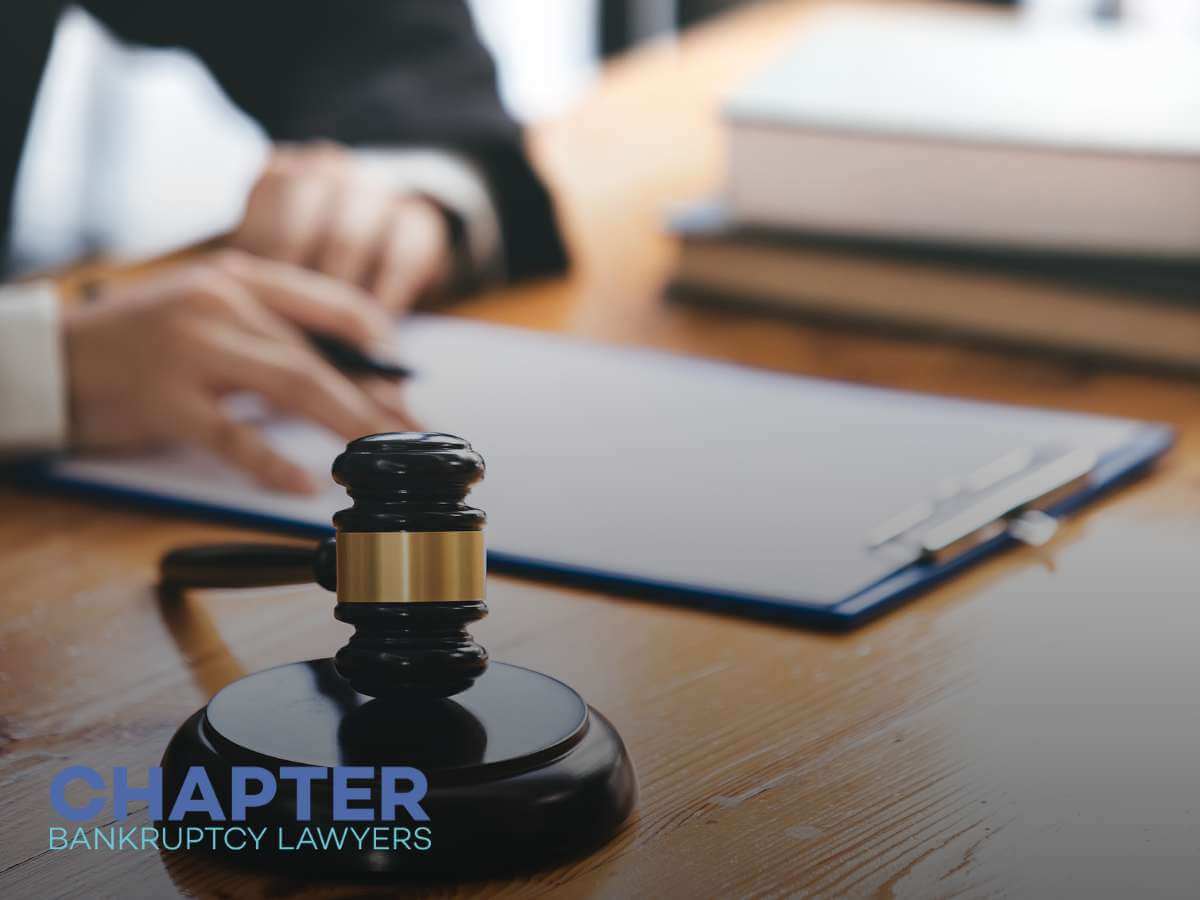
The Automatic Stay: Your Shield Against Lawsuits
When you file for bankruptcy, an automatic stay goes into effect. This powerful legal tool halts almost all collection actions, including lawsuits, wage garnishments, and foreclosures. Once your bankruptcy petition is filed, creditors must pause their legal actions, giving you the opportunity to address your debts without the pressure of ongoing litigation. However, there are exceptions, so it’s critical to consult with an expert bankruptcy attorney to understand how the automatic stay applies to your specific case.
How To Protect Your Assets During Bankruptcy
Filing for bankruptcy doesn’t necessarily mean losing your home or car. Chapter 7 bankruptcy allows you to use exemptions to protect certain assets within state and federal limits. Alternatively, Chapter 13 bankruptcy provides a repayment plan that helps you catch up on missed payments and retain essential property. An experienced bankruptcy attorney can guide you through the process to maximize asset protection.
Choosing The Right Bankruptcy Chapter
Your choice of bankruptcy chapter depends on your financial situation, including your income and the types of debt you owe. Chapter 7 is ideal for quickly discharging unsecured debts, like credit cards or medical bills, if you qualify based on income. Chapter 13 bankruptcy is better suited for individuals with a steady income who want to create a repayment plan to keep secured assets. An attorney can evaluate your circumstances and recommend the best option for you.
What Happens To Your Debts?
Bankruptcy eliminates many types of unsecured debts, such as credit card balances, personal loans, and medical bills. However, certain obligations—like student loans, child support, alimony, and some taxes—are generally non-dischargeable. For secured debts tied to assets, you may need to reaffirm or repay them to retain the collateral. Understanding what debts can and cannot be discharged is essential, and your attorney will ensure you are fully informed.
Why Work With A Bankruptcy Attorney?
Navigating bankruptcy laws can be overwhelming, especially if you’re facing a lawsuit. A skilled bankruptcy attorney will handle the legal complexities, ensure accurate filing of paperwork, and represent you in court hearings. They can also communicate with creditors on your behalf, protect your assets using applicable exemptions, and guide you toward the best financial outcome. With the right legal support, you can avoid costly mistakes and take the first step toward rebuilding your financial future.
Take Action Today
If a creditor is suing you, don’t wait. Filing for bankruptcy can provide the protection and relief you need to address your debts and stop legal actions. Contact us today to discuss your case and explore your options with an experienced bankruptcy attorney.
CONTACT OUR ARIZONA BANKRUPTCY LAWYERS
4500 S Lakeshore Drive Suite 300
Tempe, AZ 85282
3707 E Southern Ave
UNIT 1108, Mesa, AZ 85206
Consider bankruptcy when your debts become overwhelming and other solutions, like debt consolidation or negotiating with creditors, don’t work. If you’re struggling to make monthly payments, facing wage garnishments, constant creditor calls, or at risk of losing your home, bankruptcy may provide relief. It may also be a viable option if debt-related stress is affecting your well-being or your ability to manage day-to-day expenses. Before deciding, it’s crucial to consult with a bankruptcy attorney who can evaluate your financial situation and help you determine if filing for bankruptcy is the right path for you.
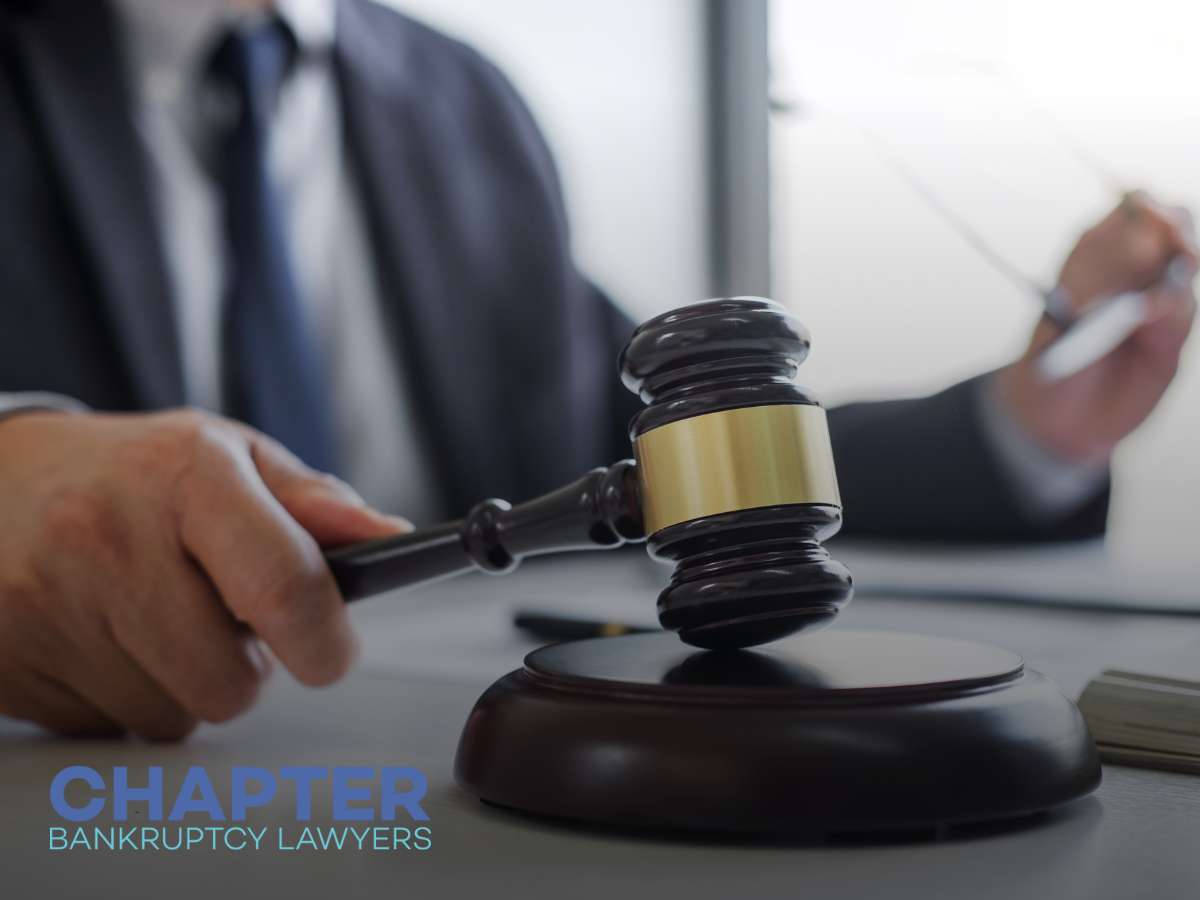
How Do I Decide Which Chapter To File?
To decide between Chapter 7 and Chapter 13, assess your financial situation and your goals. Chapter 7 works well if you have limited disposable income and want a faster resolution since it allows you to discharge most unsecured debts quickly. However, if you have significant assets like a home and want to protect them, Chapter 13 may be better, as it involves a repayment plan. Eligibility for each chapter depends on your income, assets, and debt type, so consult a bankruptcy attorney to choose the best option for your needs.
Will Bankruptcy Eliminate All My Debts?
Bankruptcy can wipe out many unsecured debts like credit card bills, personal loans, and medical debt. However, some debts, such as student loans, child support, alimony, certain taxes, and debts from fraud or criminal actions, remain intact after bankruptcy. If you file Chapter 13, you may need to repay part of these through your repayment plan. It’s essential to meet with a bankruptcy attorney to understand which debts can be discharged and which must still be addressed after the bankruptcy process.
Can I Keep My Home & Car If I File For Bankruptcy?
When filing for bankruptcy, you can keep your home and car, but it depends on your specific case and which chapter you file. If you choose Chapter 13, you’ll likely keep these assets as long as you stick to your repayment plan. With Chapter 7, you can still protect your home and car by using state exemptions, which allow you to keep certain assets up to a specific value. If your equity in these items exceeds the exemption limits, the court may require you to sell them to pay creditors.
How Long Does The Bankruptcy Process Take?
The time it takes to complete bankruptcy varies based on the chapter you file. If you go with Chapter 7, the process usually lasts about 3-6 months from start to finish. After filing, the court reviews your case, and your eligible debts are discharged. With Chapter 13, the process can take 3-5 years since it involves setting up and following a court-approved repayment plan. Once you complete your payments, any remaining eligible debts get discharged. The duration depends on your repayment plan and financial situation, so make sure to discuss the timeline with your lawyer.
Do I Need A Lawyer To File For Bankruptcy?
Although the law doesn’t require you to hire a lawyer for bankruptcy, doing so is highly recommended. An Arizona bankruptcy lawyer can guide you through the legal process, making sure you file all documents correctly, meet deadlines, and maximize the protection of your assets. They can also help you decide whether Chapter 7 or Chapter 13 is right for you and deal with your creditors on your behalf. Without a lawyer, you risk mistakes that could delay your case, lead to rejection, or jeopardize your assets.
CONTACT OUR ARIZONA BANKRUPTCY LAWYERS
4500 S Lakeshore Drive Suite 300
Tempe, AZ 85282
3707 E Southern Ave
UNIT 1108, Mesa, AZ 85206
According to bankruptcy law, your filing will remain on your credit report for ten years. However, you can start repairing your credit right away. In other words, filing for bankruptcy will have a significant impact on your credit, but it won’t ruin it for good.
While your credit score will drop initially and the bankruptcy will stay on your credit report for several years, it’s not a permanent mark.
Making timely payments on your car, mortgage, rent, and other bills will help your credit score after you have been discharged from bankruptcy. Many people who have filed for bankruptcy can purchase a car or even a home within a year of filing!
What Is The Immediate Impact On Credit When Filing For Bankruptcy?
Filing for bankruptcy has a significant initial impact on your credit score. Bankruptcy is considered a major negative event by credit reporting agencies, and it can cause your credit score to drop dramatically, often by 100 to 200 points or more, depending on your starting score. This drop occurs because bankruptcy shows that you are unable to meet your financial obligations, which is a red flag for lenders.
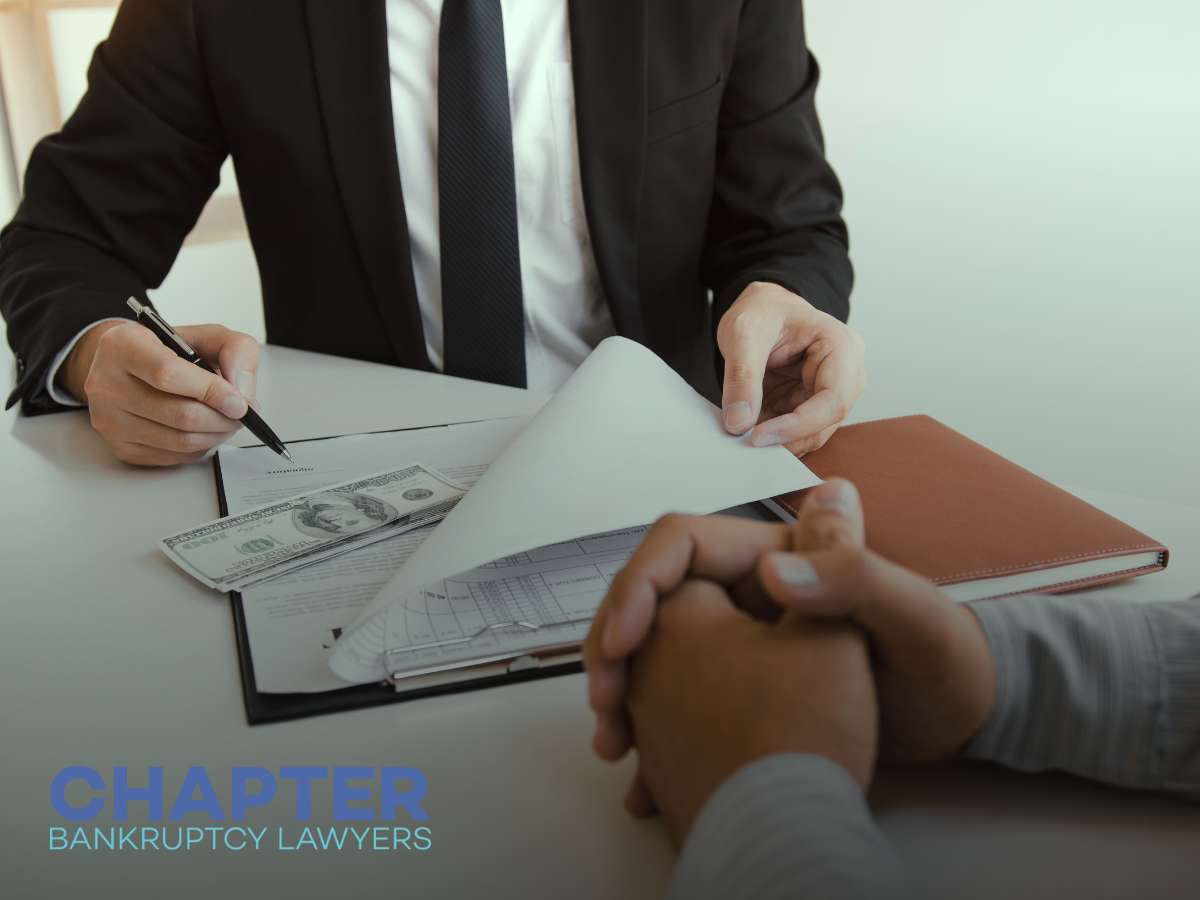
However, many factors influence how big this impact is and how it’ll affect your credit report. The type of bankruptcy is usually the first thing that indicates how long it’ll stay on your credit report. Keep in mind that Chapter 7 bankruptcy remains for up to 10 years, while Chapter 13 can stay for 7 years.
Will Bankruptcy Wipe Out All Of My Debts?
Not every debt can be discharged in bankruptcy. In a Chapter 7 bankruptcy, most unsecured debts, such as credit cards, medical bills, and personal loans, can be discharged. However, certain obligations, such as child support, alimony, most student loans, and tax debts, are typically non-dischargeable. Similarly, you will still owe secured debts, such as mortgages or car loans, unless you surrender the assets that secure these loans. In Chapter 13, debts are restructured rather than eliminated, allowing you to pay them over time. While bankruptcy offers substantial relief, it’s important to understand which debts will still need to be managed after the process is complete.
Will I Lose All My Assets If I File For Bankruptcy?
Whether you lose assets in bankruptcy depends on the type you file. In Chapter 7 bankruptcy, some of your assets may be sold (liquidated) to pay off creditors. However, each state has “exemptions” that allow you to keep certain essential assets, like your home, car, personal belongings, or retirement accounts. Chapter 13 bankruptcy, on the other hand, allows you to keep your assets while setting up a repayment plan to pay off debts over time. Many people can keep most, if not all, of their property during bankruptcy, but it’s important to discuss specific exemptions with a bankruptcy attorney to understand how your assets may be affected.
Can I File For Bankruptcy More Than Once?
Yes, you can file for bankruptcy more than once, but there are restrictions on how often you can do so and receive a discharge. For example, if you previously filed for Chapter 7 bankruptcy and received a discharge, you must wait eight years from the filing date before filing for Chapter 7 again. If you filed for Chapter 13 bankruptcy and received a discharge, you must wait two years before filing another Chapter 13 case. If you’re switching between Chapter 7 and Chapter 13, the waiting periods differ. The timeframes are in place to prevent abuse of the bankruptcy system, but multiple filings are allowed under specific conditions. Consulting with an experienced Arizona bankruptcy lawyer can help clarify these rules.
Can I Rebuild My Credit After Filing For Bankruptcy?
Yes, you can rebuild your credit after filing for bankruptcy. To start the rebuilding process, create a budget and stick to it so you avoid falling into debt again. Secured credit cards are a great way to demonstrate responsible credit use; by making timely payments, you’ll slowly improve your credit score. Keeping balances low, avoiding new debt, and making all bill payments on time are crucial steps. Within a few years, with consistent effort, you can recover a healthy credit score, making it possible to qualify for loans, credit cards, and even home mortgages in the future.
CONTACT OUR ARIZONA BANKRUPTCY LAWYERS
4500 S Lakeshore Drive Suite 300
Tempe, AZ 85282
3707 E Southern Ave
UNIT 1108, Mesa, AZ 85206
CONTACT OUR ARIZONA BANKRUPTCY LAWYERS
•
BEGIN FILING BANKRUPTCY IN ARIZONA FOR $0 DOWN
•
Getting a fresh financial start and wiping out debt begins with a FREE CONSULTATION and debt evaluation with our experienced Arizona Bankruptcy attorney. Chapter Bankruptcy Lawyers offers expert legal representation and $0 down to file your bankruptcy.
• Chapter 7 Bankruptcy • Chapter 13 Bankruptcy • Eliminate Debt with $0 Down • Free Debt Evaluation • Experienced, Trusted Attorney
After evaluating your debt, our attorney will recommend the best means by which to wipe out your debt. Next, upon qualifying for our program, you pay $0 down for legal fees. A payment arrangement is agreed upon in order to make low monthly payments for post-filing costs.
GET STARTED
GET IN TOUCH
with an experienced Arizona bankruptcy attorney
3707 East Southern Avenue Suite #1108
Mesa, AZ 85206
480.485.1010
map + directions
FIND OUR OFFICE
4500 S Lakeshore Drive Suite 300
Tempe, AZ 85282


